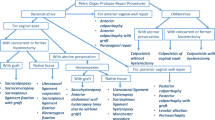Abstract
Rectal prolapse can be a disabling condition for those affected. Treatment has historically been by transanal or abdominal approaches, with transanal approaches tending to have lower morbidity, and abdominal approaches having lower recurrence rates. With the advent of laparoscopy, many of the numerous described abdominal operations have been reported with a minimally invasive approach. Although few randomized data exist, laparoscopic operations appear to provide equal rectal fixation to open surgery, with less morbidity. Coexistent symtoms such as fecal incontinence and constipation must be evaluated before surgery, so that the operation can be tailored to the needs of the individual patient. Patients with severe constipation are often offered a concomitant sigmoid resection, although this does increase the potential for complications. Patients with incontinence, diarrhea, or otherwise normal function can be offered a rectopexy without resection.
Similar content being viewed by others
References
Delaney CP, Senagore AJ. Rectal prolapse. In Fazio VW, Church JM, Delaney CP eds. Current Therapy in Colon and Rectal Surgery, 2nd ed. Philadelphia, PA: Elsevier, Mosby Inc., 2005, pp 131–134
Kim DS, Tsang CB, Wong WD, Lowry AC, Goldberg SM, Madoff RD. Complete rectal prolapse: evolution of management and results. Dis Colon Rectum 1999;42:460–466.
Delaney CP, Kiran RP, Senagore AJ, Brady K, Fazio VW. Case matched comparison of clinical and financial outcome after laparoscopic or open colectomy. Ann Surg 2003;238:67–72.
Senagore AJ, Delaney CP. A critical analysis of laparoscopic colectomy at a single institution: lessons learned after 1000 cases. Am J Surg 2006;191(3):377–380.
Madbouly K, Senagore AJ, Delaney CP, Duepree HJ, Brady KM, Fazio VW. Clinically based management of rectal prolapse: a comparison of laparoscopic Well’s procedure versus resection rectopexy. Surg Endosc 2003;17:99–103.
Himpens J, Cadiere GB, Bruyns J, Vertruyen M. Laparoscopic rectopexy according to Wells. Surg Endosc 1999;13:139–141.
Kariv Y, Delaney CP, Casillas S, Hammel J, Nocero J, Bast J, Brady K, Fazio VW, Senagore AJ. Long-term outcome after laparoscopic and open surgery for rectal prolapse. Surg Endosc 2006;20:35–42.
Sullivan ES, Longaker CJ, Lee PY. Total pelvic mesh repair: a ten-year experience. Dis Colon Rectum 2001;44:857–863.
Hool GR, Hull TR, Fazio VW. Surgical treatment of recurrent complete rectal prolapse: a thirty-year experience. Dis Colon Rectum 1997;40:270–272.
Author information
Authors and Affiliations
Corresponding author
Rights and permissions
About this article
Cite this article
Delaney, C.P. Laparoscopic Management of Rectal Prolapse. J Gastrointest Surg 11, 150–152 (2007). https://doi.org/10.1007/s11605-007-0107-1
Published:
Issue Date:
DOI: https://doi.org/10.1007/s11605-007-0107-1




